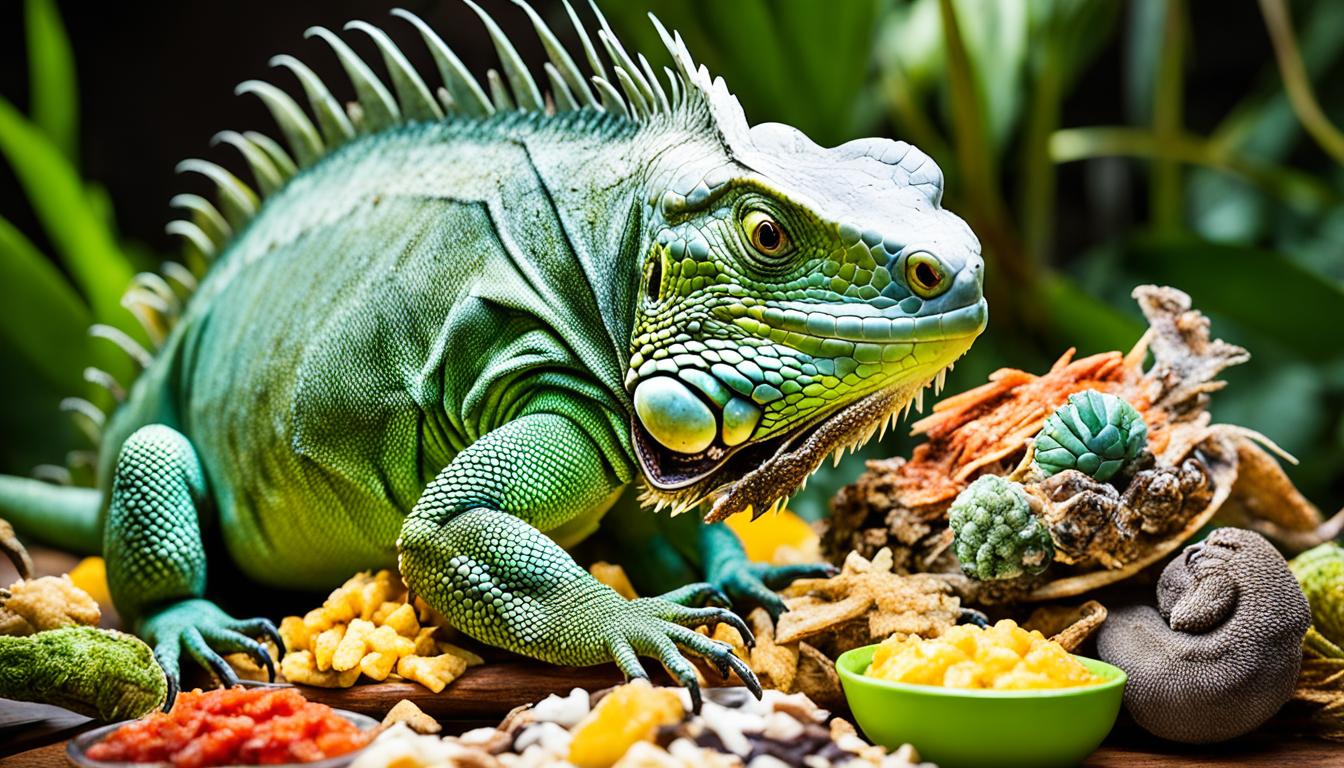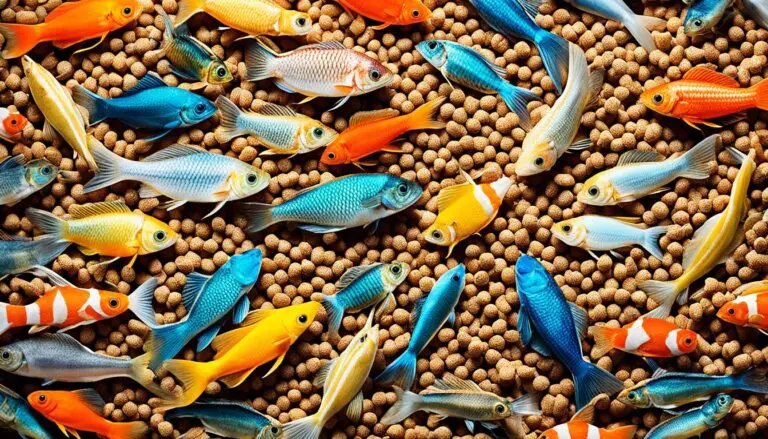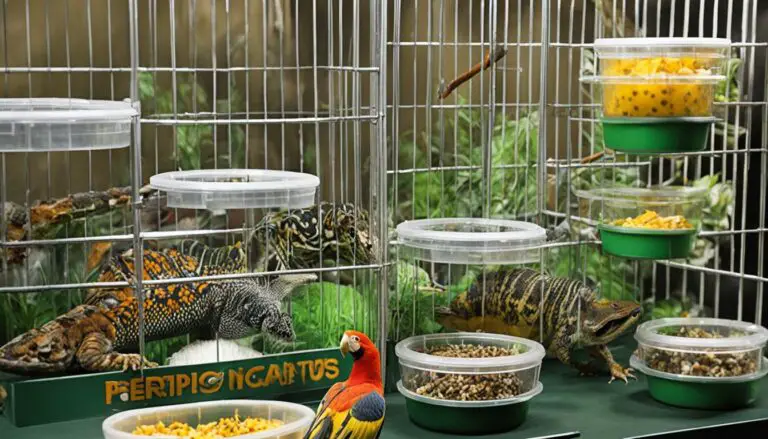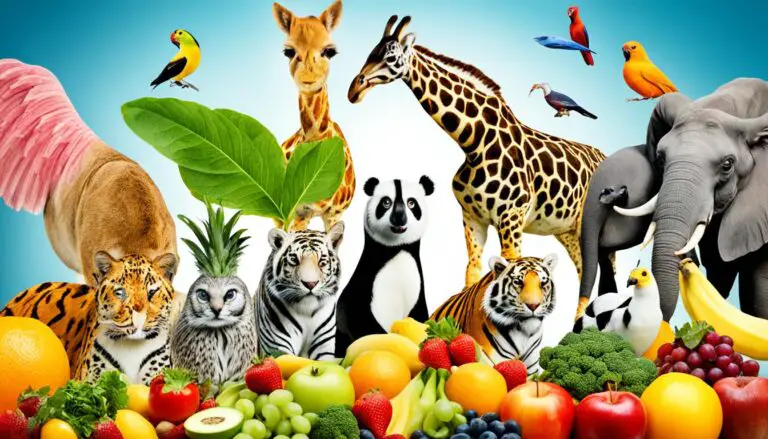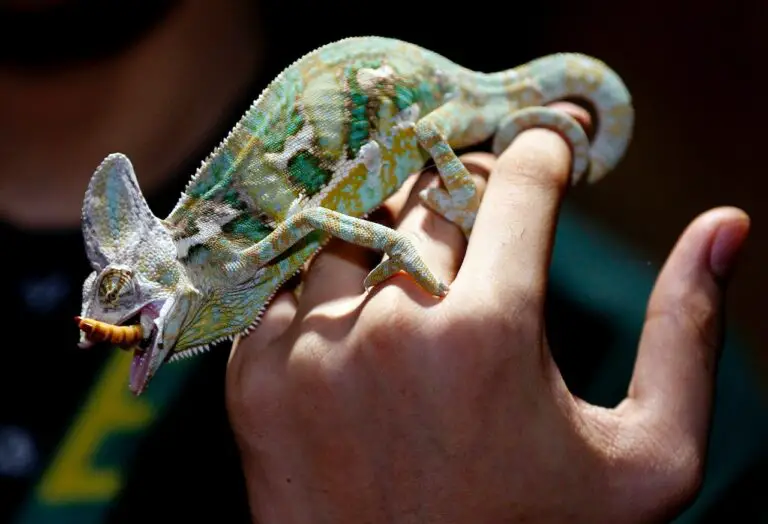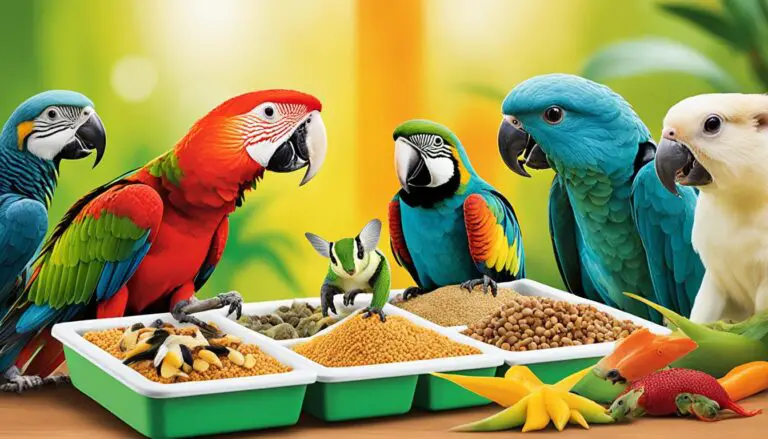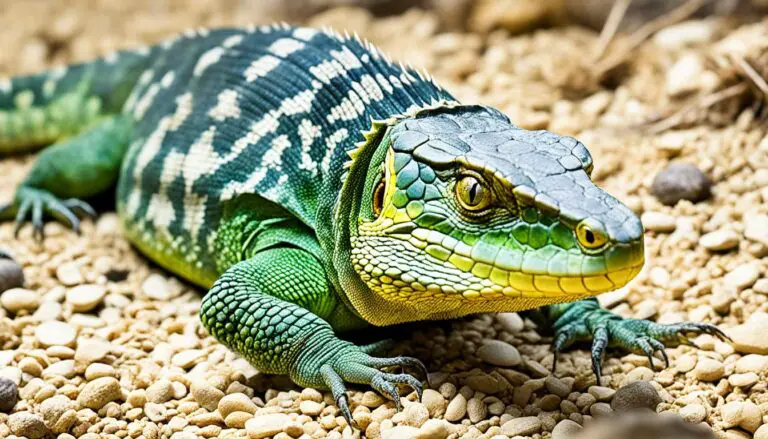Protein & Fat Needs for Carnivorous Exotic Pets
Carnivorous exotic pets like felids, canids, mustelids, and viverrids need specific protein and fat levels for top health. A balanced diet is vital for their nutrition and well-being.
Exotic pet nutrition focuses on the right amounts of protein and fats. Most zoos in the USA use complete commercial diets for these pets. These diets have 45-50% protein and 30-35% fat and are made from horsemeat, beef, and poultry.
Adding essential nutrients like calcium, vitamin A, iodine, taurine, and B vitamins is key. Animals like exotic felids need extra fat, protein, and vitamin A, more so than canids. A mixed diet cuts down on nutritional issues and is ideal for their health.
Key Takeaways:
- Carnivorous exotic pets need specific protein and fat levels for best health.
- Many in the USA use complete diets based on horsemeat, beef, and poultry for these pets.
- It’s important to add nutrients like calcium, vitamin A, iodine, taurine, and B vitamins.
- Exotic felids need more fat, protein, and vitamin A than canids.
- A mixed diet helps avoid nutritional problems for these special animals.
Protein and Fat Requirements for Carnivorous Reptiles
Carnivorous reptiles, like snakes and lizards, need special diets. They eat lots of protein because they are meat-eaters. They also need certain fats for good health.
It’s vital to give your snake or lizard the right food. This helps avoid health problems like being overweight. A reptile nutrition expert can help you figure this out.
Every reptile is unique when it comes to what they should eat. For example, what a snake needs may differ from a lizard’s needs. Talking to an expert ensures your pet gets the ideal mix of protein and fat.
Good nutrition is key to keeping your pet healthy. A diet that meets their needs will keep them strong and lively.
Beneficial Protein and Fat Sources for Carnivorous Reptiles:
- Whole prey items, such as mice, rats, and chicks
- Commercially available reptile food that’s high in protein*
- Insects like crickets, mealworms, and dubia roaches
- Special supplements with calcium and vitamins*
Getting advice from a reptile nutrition specialist is valuable. They can recommend the best food for your pet.
“Providing a balanced diet that meets the protein and fat requirements of carnivorous reptiles is essential for their overall health and well-being.”
Meeting the Nutritional Needs of Herbivorous Exotic Pets
Carnivorous and herbivorous exotic pets have different food needs. For example, iguanas eat plants. To keep iguanas healthy, they need a low-fat, high-fiber diet. It’s vital to get their proteins from plants to give them the best nutrition.
For herbivorous exotic pets to be healthy, they must eat a balanced diet. This means they need a lot of different vegetables and plant-based proteins. This variety meets their exact needs and keeps them well.
Fiber-Rich Diet
A diet high in fiber is very important for herbivorous pets. Fiber helps their digestive system and keeps it working well. They should eat vegetables like leafy greens and crunchy fruits every day.
Veggies like squash, sweet potatoes, and broccoli are also essential. They bring in important vitamins and minerals. Including a variety of plants makes sure they get all they need.
Plant-Based Protein Sources
Even though herbivorous pets don’t need lots of protein, they still need some. Things like lentils and chickpeas are great for this. Other good options are green peas, tofu, and quinoa.
A vet who knows about exotic pets can help you choose the best food. They will make sure your pet gets exactly what they need to grow and stay healthy.
Consulting with a Qualified Vet
Always talk to a vet when you need to feed your exotic pet. They understand the special needs of each animal. A vet can create a food plan that fits your pet perfectly.
This personalized plan aims to keep your herbivorous pet in top shape. It covers all their nutritional needs, ensuring their health and happiness.

Meeting the nutritional needs of herbivorous exotic pets is crucial for their health and wellbeing.
Importance of High-Quality Food for Exotic Pets
For meat-eating exotic pets, the food’s quality is very important. It affects their health a lot. Good food keeps them healthy and stops health issues. Bad food can hurt them and might be deadly.
It’s best to buy special diets made just for these pets. These diets are full of everything the pets need. They’re safe and clean, with no bad stuff.
Packages usually tell you when and how much to feed your pet. This helps set a good eating routine.
Good food is key for these exotic pets. Bad or dirty food can make them very sick or even kill them.
The best foods for these pets copy what they’d eat in nature. They have the perfect mix of proteins and fats. This keeps the pets full of energy and healthy.
Top-quality pet food is checked a lot to make sure it’s healthy. This makes owners feel good. They know they’re giving their pets the best.
Also, food makers give advice on feeding. They say how much and how often to feed. This info is just for the kind of pet you have.
Benefits of High-Quality Food for Exotic Pets:
- Meets their specific nutritional needs
- Provides the right balance of protein and fat
- Enhances energy levels and vitality
- Promotes healthy muscle development
- Supports overall health and well-being
- Reduces the risk of health problems associated with poor nutrition
Good food makes a big difference for these pets. It helps them live a longer and happier life. A vet can give you the best food tips for your pet.
| Benefits of High-Quality Food | Details |
|---|---|
| Meets specific nutritional needs | High-quality commercial diets are formulated to provide all the necessary nutrients required by carnivorous pets. |
| Provides the right balance of protein and fat | Carnivorous pets require a diet rich in animal proteins and fats for optimal health and energy. |
| Enhances energy levels and vitality | A balanced and nutritious diet helps boost energy levels and overall vitality in carnivorous exotic pets. |
| Promotes healthy muscle development | High-quality food supports healthy muscle development, ensuring your pet remains strong and agile. |
| Supports overall health and well-being | Providing a high-quality diet aids in maintaining optimal health, which is crucial for carnivorous exotic pets. |
| Reduces the risk of health problems | Feeding high-quality food reduces the likelihood of nutritional deficiencies and related health issues. |
Each kind of pet has different food needs. A vet can help make sure your pet is eating right. They’ll keep your pet healthy.

Establishing a Feeding Schedule for Exotic Pets
Ensuring your exotic pet gets the right nutrition is key to their health. A crucial part is setting up a feeding routine that fits their needs. This is important for their diet, just as it is for animals that eat meat.
Carnivorous exotic pets need careful thought put into their meal plans. You need to think about how often and how much they should eat. For some, little meals many times a day are best. Others do well with big meals less often. To find what’s perfect, consider your pet’s type, age, and how active they are.
It’s a good idea to start with the food makers’ advice on feeding. They can tell you how much and how often to feed your pet for the right nutrients. Also, talking to a vet who knows about exotic pets can really help. They can give you advice customized to your pet, ensuring they stay healthy.
Keep your pet on a regular eating schedule to give them the nutrition they need at the right times. This supports their growth and keeps their energy up. It also helps prevent them from eating too much or not enough.
Watch how your pet acts around food. They may need some changes in their diet because of what they like or if they’re not feeling well. It’s also smart to check their weight. If it changes a lot, it may be time to talk to a vet.
Feeding Schedule Guidelines for Exotic Pets
Here are some tips for a good feeding schedule for your pet:
- First, talk to a vet who knows exotic animals. They can help you know how often and how much to feed your pet.
- Your pet might like having many small meals a day or a few large ones. It depends on what’s best for them.
- Try to give meals at the same times every day. This helps your pet know when to expect their food. It’s also good for their digestion.
- Always keep an eye on your pet while they eat. This will help you make sure their meal time is going well and they’re digesting food right.
- If you notice any big changes in your pet’s weight or health, you might need to change their food routine. This could mean eating more or less, depending on what they need.
Remember that each exotic pet is special, with unique food needs. A vet who is great with exotic animals can offer you personalized advice. This ensures your pet lives its best life.

| Species | Feeding Frequency | Portion Sizes |
|---|---|---|
| Exotic Felids | 2-3 times a day | Varies based on size and age |
| Exotic Canids | 1-2 times a day | Varies based on size and age |
| Mustelids | 2-3 times a day | Varies based on species and age |
| Viverrids | 1-2 times a day | Varies based on species and age |
Providing Adequate Water and Liquids for Exotic Pets
Adequate water intake is key for exotic pets’ health. Different pets need different amounts of water. It’s important to give them clean, fresh water. Amphibians, for example, need high humidity. Some need water to drink.
Research what your pet needs and give it. Some may need extra fluids, like nutritional supplements. Always check with a vet to confirm you’re meeting your pet’s hydration needs.

Exotic pets must stay hydrated, whether by drinking or from the air’s moisture. The right water conditions are vital. So, is the proper amount of fat in their diet for their health.
Hydration is critical for their organs and digestive system. Each exotic pet has its water needs. For example, amphibians might need a place to soak. Birds or small mammals need clean water.
Some pets may need more than water. They might need special fluids or supplements for health. Always talk to a vet to make sure you’re doing the best for your pet.
Providing the right hydration is our duty as exotic pet owners. Learning their water needs and fulfilling them is crucial for their health.
Always offer clean, fresh water. Be sure it’s free of harmful substances. Learn what your pet needs for water and moisture in their habitat.
Meeting your exotic pet’s hydration needs is essential for their well-being. Make sure they have enough water and, if needed, other necessary liquids.
Consulting with a Qualified Vet for Exotic Pet Nutrition
It can be tough to give the right food to exotic pets. Each type needs its own special diet. To make sure your meat-eating pet gets what it needs in food, talk to a vet who knows about exotic pet diets.
This vet will know all about what kind of food different exotic pets must eat. They understand the needs for protein and fat these animals have. They will look at your pet’s age, health, and how active they are. Then, they can tell you exactly what your pet should eat.
The vet can help you set up a food plan just for your pet. They will decide how much and how often to feed your pet. This way, your pet gets everything they need without eating too much or too little.
Also, a good vet can help you pick the best foods for your exotic pet. They know which brands are trustworthy and what to look for on food labels. This makes sure your pet’s meals are healthy and balanced.
Working with a vet means they can keep an eye on what your pet eats. They can change the diet if your pet’s health or how active they are changes. This is important to keep your pet healthy and happy.
It’s key to feed your exotic meat eater right for their health and happiness. A vet who knows a lot about special diets for exotic pets is the best help. They will make sure your pet has the right food to thrive and live their best life.
| Benefits of Consulting with a Qualified Vet for Exotic Pet Nutrition |
|---|
| Access to expert knowledge and guidance on exotic pet dietary needs |
| Assessment of your pet’s specific needs based on age, health status, and activity level |
| Development of a personalized feeding schedule for your exotic pet |
| Recommendations for high-quality foods that meet carnivorous dietary needs |
| Ongoing monitoring and adjustment of your pet’s nutritional plan |
Ensuring the Health and Well-being of Carnivorous Exotic Pets
Feeding carnivorous exotic pets right is essential. They need a diet high in protein and fat for good health. This kind of diet stops them from having health problems.
“Proper nutrition is the key to keeping your carnivorous exotic pet healthy and thriving.”
Choose well-made commercial diets for these pets. The food must be packed with protein and fat. It should also have important vitamins and minerals.
High-Quality Commercial Diets for Carnivorous Exotic Pets
High-quality foods for these pets are designed to be like the prey they eat in the wild. This ensures they get all the right nutrients they need.
These foods are checked carefully to make sure they are safe. By giving them high-quality food, your exotic pet can avoid health problems.
Get advice from a vet who knows about these kinds of pets. They can suggest the best food for your pet based on its type and needs.
Supplementing with Vitamins and Minerals
Sometimes, your pet might need extra vitamins and minerals. This is to make sure they get all the nutrients they need to be healthy.
Talk to your vet to see if your pet needs any supplements. They can tell you exactly what your pet should take and how often.
Following a Recommended Feeding Schedule
Feeding your pet on a regular schedule is key. It keeps their metabolism and digestion healthy, which prevents health issues.
A vet can give you a schedule that fits your pet’s needs. This will help make sure your pet gets the right amount of food each day.
When changing your pet’s food, do it slowly. Watch how your pet reacts. If they act strangely, talk to your vet immediately.
Benefits of a Balanced Diet for Carnivorous Exotic Pets
| Benefit | Description |
|---|---|
| Optimal Health | A balanced diet, ensures they have the nutrients they need to be healthy. |
| Strong Immune System | It helps them fight off diseases because they are getting the right nutrition. |
| Healthy Skin and Coat | This keeps them looking great and feeling their best. |
| Improved Digestion | Helps them digest their food properly, lowering the risk of stomach issues. |
| Maintained Muscle Mass | It supports their muscles, making them strong and agile. |
With the right diet, supplements, and feeding schedule, your exotic pet will be happy and healthy.
Conclusion
Proper nutrition is key for the health of exotic pets that eat meat. Make sure they get enough protein and fat in their diet. This helps prevent health problems and keeps them strong. Always talk to a vet to find out what your specific pet needs.
Exotic pet nutrition is not the same as for regular pets. A vet can give you the best advice on what to feed your animal. They’ll help you pick good foods and set a feeding plan. This way, your pet will get all the nutrients it needs.
By focusing on what your exotic pet eats, you can boost its health and life. It’s important to choose food carefully and work with a vet. Doing these things will make your pet happy and healthy for a long time.
FAQ
What are the protein and fat requirements for carnivorous exotic pets?
What are the protein and fat requirements for carnivorous reptiles?
What are the dietary needs of herbivorous exotic pets?
How important is high-quality food for exotic pets?
How do I establish a feeding schedule for my exotic pet?
How do I provide adequate water and liquids for my exotic pet?
Why is it important to consult with a qualified vet for exotic pet nutrition?
How can I ensure the health and well-being of my carnivorous exotic pet?
What should I keep in mind about exotic pet nutrition?
Source Links
- https://www.amherstvh.com/post/the-importance-of-proper-nutrition-for-your-exotic-pet
- https://www.ncbi.nlm.nih.gov/pmc/articles/PMC4929903/
- https://www.merckvetmanual.com/management-and-nutrition/nutrition-exotic-and-zoo-animals/nutrition-in-zoo-carnivores
Peter Stones is the founder of Exotic Pets Place, the leading online resource for exotic pet care information.
With over 10 years of hands-on exotic pet ownership experience, he is deeply passionate about sharing his expertise to help others properly care for their unusual pets.
When he's not writing extensively researched articles or connecting with fellow exotic pet enthusiasts worldwide, you can find Peter at home tending to his own beloved menagerie of exotic animals.

